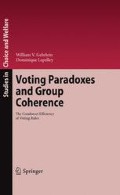Abstract
The primary objective of this chapter is to evaluate the impact that the presence of various degrees of measures of group mutual coherence have on the Condorcet Efficiency of voting rules. The Efficiency Hypothesis suggests that the Condorcet Efficiency of voting rules should increase as voters’ preferences reflect increased levels of group mutual coherence. Some preliminary work has been conducted in this area, when attention is primarily focused on group mutual coherence, as measured by the proximity of voting situations to the condition of perfectly single-peaked preferences.
Access this chapter
Tax calculation will be finalised at checkout
Purchases are for personal use only
References
Adams J (1997) Condorcet efficiency and the behavioral model of the vote. J Polit 59:1252–1263
Adams J (1999) An assessment of voting systems under the proximity and directional model of the vote. Public Choice 98:131–151
Black D (1958) The theory of committees and elections. Cambridge University Press, Cambridge
Gehrlein WV (2003a) Weighted scoring rules that maximize Condorcet Efficiency. In: Sertel MR, Koray S (eds) Advances in Economic Design, Springer-Verlag Publishers, Berlin, pp 53–64
Gehrlein WV, Lepelley D (2009c) The unexpected behavior of plurality rule. Theory Decis 63:267–293
Gehrlein WV, Lepelley D, Smaoui H (2010) Condorcet efficiency of voting rules with strong measures of group coherence. Unpublished manuscript
Lepelley D (1995) Condorcet efficiency of positional voting rules with single-peaked preferences. Econ Des 1:289–299
Lepelley D, Vidu L (2000) Règles positionnelles itératives, principe majoritaire et préférences unimodales RAIRO Oper Res 34:347–362
Lepelley D, Gehrlein WV, Smaoui H (2010) The Condorcet Efficiency of voting rules with mutually coherent voter preferences: A Borda compromise. Université de La Réunion, unpublished manuscript
Moreno B, Puy MS (2005) The scoring rules in an endogenous election. Soc Choice Welfare 25:115–125
Nurmi H (1992) An assessment of voting system simulations. Public Choice 73:459–487
Author information
Authors and Affiliations
Corresponding author
Rights and permissions
Copyright information
© 2011 Springer-Verlag Berlin Heidelberg
About this chapter
Cite this chapter
Gehrlein, W.V., Lepelley, D. (2011). Coherence and the Efficiency Hypothesis. In: Voting Paradoxes and Group Coherence. Studies in Choice and Welfare. Springer, Berlin, Heidelberg. https://doi.org/10.1007/978-3-642-03107-6_6
Download citation
DOI: https://doi.org/10.1007/978-3-642-03107-6_6
Published:
Publisher Name: Springer, Berlin, Heidelberg
Print ISBN: 978-3-642-03106-9
Online ISBN: 978-3-642-03107-6
eBook Packages: Business and EconomicsEconomics and Finance (R0)

